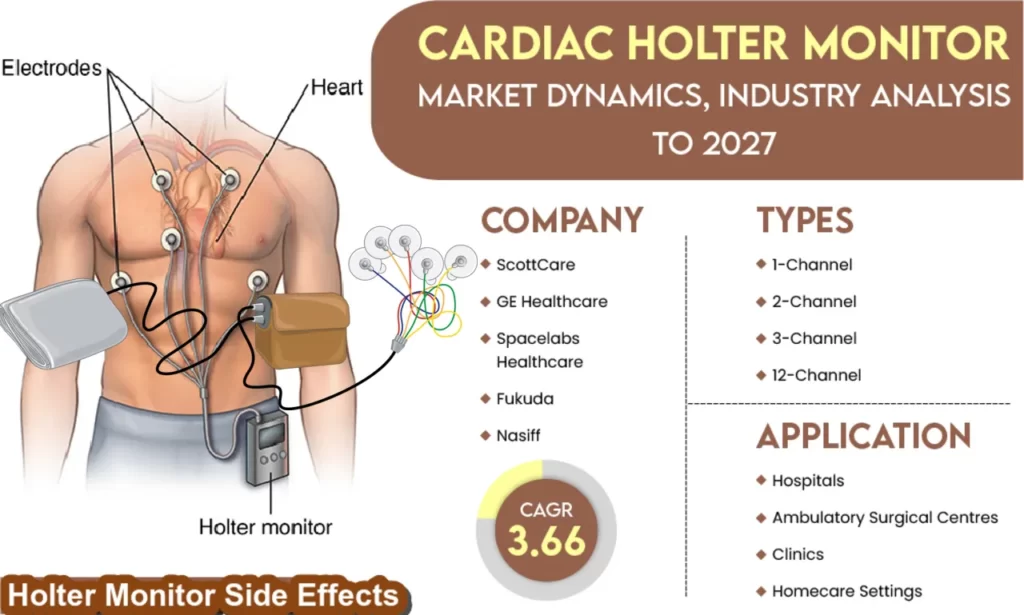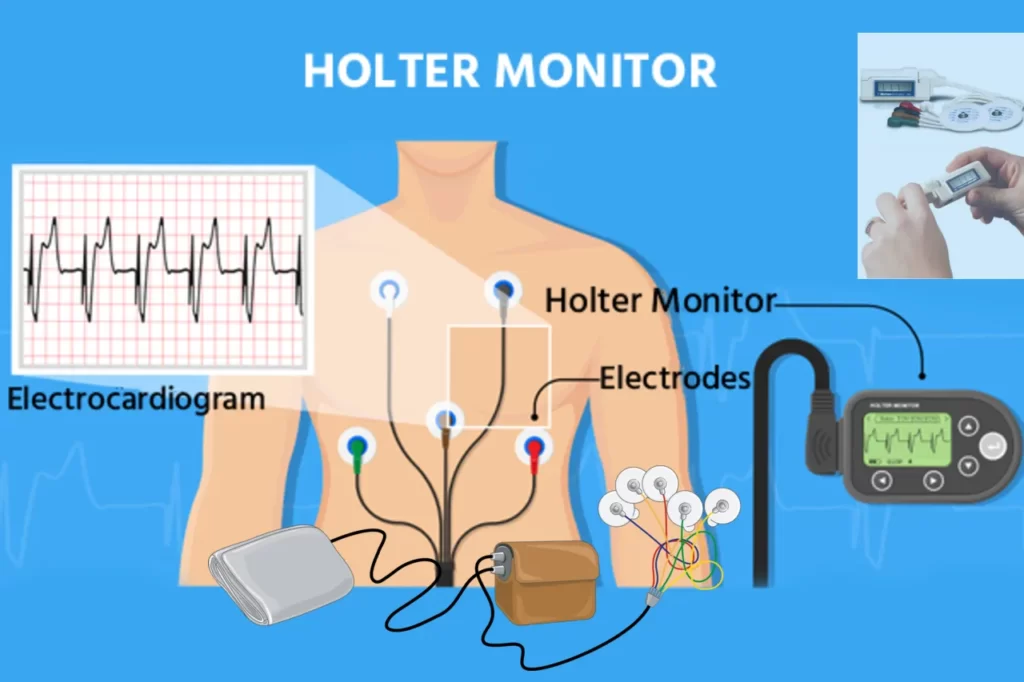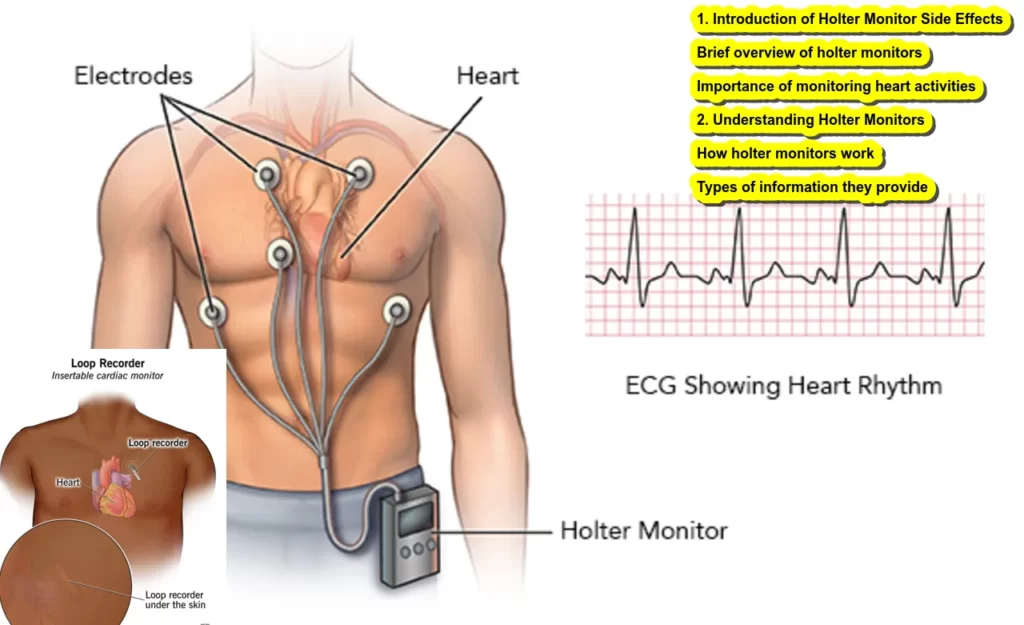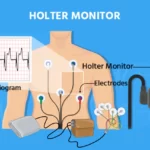
Holter Monitor Side Effects
Introduction of Holter Monitor Side Effects
Hazards. Wearing a Holter monitor carries no appreciable dangers. Where the sensors (electrodes) were positioned, some persons experienced little pain or skin irritation. Other electrical appliances often don’t influence Holter monitoring.
The unsung heroes of cardiac care—holter monitors—offer priceless insights on cardiac activity. This post will clarify common misconceptions and provide light on important factors as we go into the sometimes enigmatic world of holter monitor side effects.
Holter monitor side effects are an essential component in the field of cardiac surveillance. These compact, handheld gadgets continually log cardiac activity, providing a thorough picture that sporadic monitoring techniques would overlook. Let’s examine the specifics of holter monitor side effects and user information.

Understanding Holter Monitors
What is a Holter Monitor?
A Holter monitor is a portable, wearable device that continuously records and monitors the electrical activity of the heart over an extended period, typically 24 to 48 hours. This small, lightweight device is attached to the chest using adhesive electrodes, and it records the heart’s electrical signals, capturing data on heart rate, rhythm, and other essential parameters.
How Holter Monitors Work
Holter monitors operate by recording the heart’s electrical signals over an extended period. This continuous monitoring provides detailed information about irregularities or abnormalities, aiding in the diagnosis of various cardiac conditions.
Types of Information Provided
These monitors offer insights into heart rate, rhythm, and other crucial parameters, contributing to a holistic understanding of cardiac health. The data collected assists healthcare professionals in formulating accurate diagnoses and tailored treatment plans.
Common Side Effects
Skin Irritation
One of the most common side effects users may experience is skin irritation. The adhesive used to attach the holter monitor can sometimes lead to redness or itching. However, these symptoms are typically mild and can be managed with proper care.
Discomfort or Itchiness
Occasional discomfort or itchiness may arise during prolonged wear. This is often a result of the device’s continuous contact with the skin. To alleviate this, users can follow specific guidelines for holter monitor placement and occasionally reposition the device.
Article About:- Health & fitness
Article About:- Medical Technology
Article About:- Sports

Impact on Sleep Patterns
Holter monitors can, on occasion, disrupt sleep patterns due to their continuous monitoring. However, understanding these potential disturbances and making adjustments to one’s sleep routine can help minimize any impact.
Less Common Side Effects
Allergic Reactions
While rare, some users may experience allergic reactions to the materials in holter monitors. Swift identification of such reactions and seeking medical advice promptly is crucial in these cases.
Device Malfunction
Holter monitors, like any electronic device, may experience malfunctions. Regular checks and following usage guidelines significantly reduce the likelihood of such issues. Users should promptly report any unusual behavior in the device.
What To Expect
Prior to your Holter monitor exam, you will get instructions from your healthcare physician. Prior to the test, being aware of these things will help reduce any worry or dread you may be feeling.
Before the Test
Timing:
The best time to administer the test will be decided upon jointly by you and your healthcare professional. Almost any 24-48 hour period will usually work, but the ideal time is when you are not planning water-based activities, activities that will leave you drenched in perspiration (you need to keep dry when wearing a Holter monitor), or when you are not traveling (to prevent issues at airport security).
Location:
To have your Holter monitor fitted by a technician, you will need to visit an outpatient clinic, often located at a nearby hospital.5. That only takes a few minutes. When the test is over, you could be requested to come back to the same location to have the Holter removed, although a lot of Holter laboratories now use delivery services to come get the recorder from your house.
What to Wear:
You can dress whatever you choose, but a loose-fitting shirt is necessary to allow the Holter monitor to be worn underneath comfortably.
Holter Monitor Electrode Placement:
The electrodes, which resemble a half-dollar piece, will be placed on your chest in the proper spots by a technician when you get to the Holter laboratory and connected to the monitor.5 For the electrodes to stick effectively, men might need to shave in little spots.
The technician will provide you advice on how to wear the recording device, what to do and what not to do, and how to record your activities and symptoms in a journal. After that, you’ll be sent on your way.
Other Preparation:
Before the test, you can continue to eat and drink as usual. You can also continue to take your regular medication, unless instructed differently by your healthcare professional. Since you won’t be able to wash while wearing the monitor, it’s a good idea to take a shower before starting a Holter monitor study.

Holter Monitor Test Cost
The study is not always inexpensive. Holter monitor tests are covered by almost all health insurance plans as long as a qualified physician orders them. However, it’s always a good idea to verify with your insurance provider first.
Holter Monitor vs Other Monitoring Methods
In comparison to other cardiac monitoring devices, holter monitors excel in providing continuous, real-time data. This sets them apart, particularly when diagnosing intermittent cardiac issues that might go unnoticed with periodic monitoring.
Holter Monitor Usage Guidelines
Duration of Usage
The duration of holter monitor usage varies based on the specific monitoring needs of the individual. Healthcare professionals will provide guidance on how long the device should be worn, ensuring optimal data collection.
Safety Considerations for Children
Holter monitors are generally safe for children, but certain considerations need attention. Ensuring the device is securely attached and explaining the process to the child can contribute to a successful monitoring experience.
Maintaining Holter Monitor Integrity
Showering with the Device
Contrary to common belief, showering with a holter monitor is often permissible. However, users should follow specific guidelines provided by healthcare professionals to ensure the device’s integrity is maintained.
Dietary Restrictions, If Any
In most cases, holter monitoring doesn’t require specific dietary restrictions. However, consulting with healthcare providers on any potential considerations ensures a comprehensive approach to monitoring.
User Experience and Tips
Real-life Experiences
Sharing real-life experiences of individuals who have undergone holter monitoring adds a personal touch to the article. This section aims to provide insights into how users navigate and manage side effects.
Tips for a Seamless Monitoring Experience
Practical tips, such as keeping the skin clean and dry, choosing loose-fitting clothing, and staying well-hydrated, contribute to a more comfortable monitoring experience. These suggestions aim to empower users to proactively manage potential side effects.
Holter Monitor Test Results
It’s crucial to keep in mind that the primary goal of a Holter study is to determine whether or not your unexplained symptoms are caused by a cardiac arrhythmia while evaluating the data.3. This means that the diagnosis depends on the ability to actually link symptoms to a concurrent arrhythmia.
A typical Holter monitor reading won’t reveal any appreciable variations in your heart’s rhythm. The majority of people have benign arrhythmias on occasion, which are very common and do not result in any symptoms at all.
When an arrhythmia like this is seen on the Holter report without accompanying symptoms, it typically means that there is no issue and that therapy or more testing is not necessary.

Holter Monitor Side Effects Summery
Holter monitors are unwavering protectors in the ever-changing field of cardiac health, providing constant insights into our hearts’ rhythm. Even if there are some negative effects, they are surpassed by how much better cardiac care these devices can provide.
Equipped with the knowledge presented in this tutorial, users may approach the experience with confidence as they set out on their holter monitoring adventure. Future monitoring experiences should be even more fluid and intuitive because to ongoing developments in medical technology.
FAQs
Are there any side effects of Holter test?

There are very few risks connected to the Holter monitor. Extended usage of the adhesive electrode patches may result in skin irritation or tissue deterioration at the application location. Other dangers can apply based on your particular medical condition.
Can Holter monitor affect heart?

Holter monitoring is a painless, risk-free procedure that is safe. Some individuals get mild skin discomfort from the sticky spots, or electrodes, that are used to track heartbeats.
What not to do during Holter test?

Our staff recommends that you stay away from the following gadgets for the whole 24-48 hours while you wear the Holter monitor:
MRI devices.
Ovens that microwave.
electric covers.
Metal detectors.
electric shavers.
Can Holter Monitors Cause Allergic Reactions?

Recognizing the possibility of allergic reactions and suggested precautions for people who are sensitive to particular materials.
How Long Can I Wear a Holter Monitor?

Providing insights into the duration of holter monitor usage and considerations for extended monitoring.
Are Holter Monitors Safe for Children?

addressing issues with child safety precautions and utilization in pediatric settings.
Can Holter Monitors Disrupt Daily Activities?

examining how Holter monitors affect day-to-day activities and how to adapt them to routines.
Can I Shower While Wearing a Holter Monitor?

provide helpful advice on how to preserve the integrity of the equipment while keeping oneself clean while being watched.
How Often Should I Check the Holter Monitor for Malfunctions?

To guarantee that the holter monitor performs at its best, routine inspections are essential. When it comes to routine checkups, users should heed the advice of their healthcare professional and the manufacturer’s guidelines. Any anomalous activity or defect has to be reported right once.




